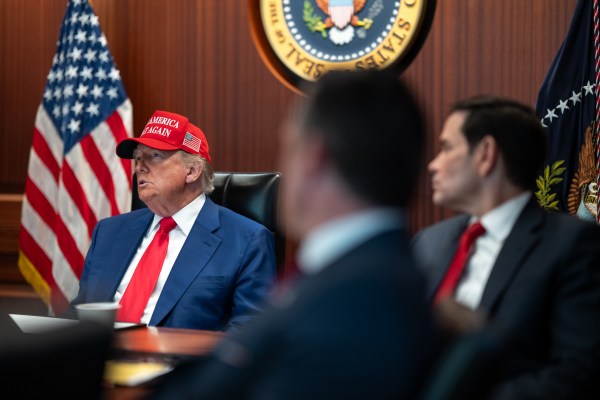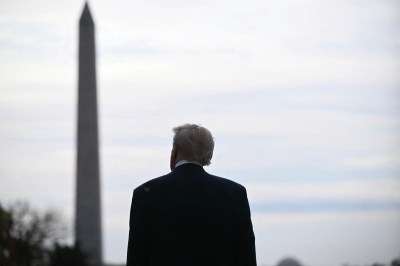Turn any article into a podcast. Upgrade now to start listening.
Premium Members can share articles with friends & family to bypass the paywall.
U.S. presidents often find themselves adapting their defense policy to balance what they envisioned during their campaigns with what events require once they’re in office. George W. Bush campaigned on a shift away from adventurism and nation-building, but the 9/11 attacks turned his focus and cemented his legacy, forever associating him with the kinds of foreign involvement he had previously criticized. Barack Obama attempted to disentangle the U.S. from the Global War on Terror to pursue a “pivot” to the Pacific, only to surge troops to Afghanistan and witness the spread of Sunni jihadism in the Levant.
Donald Trump is no exception. His 2024 campaign for reelection and early days back in office signaled a more restrained vision for the use of U.S. military might, but the Pentagon has painted a different picture entirely. Rather than offering a clear plan for how America can and should use its military power, the Department of Defense seems to dart from one shiny object to another. But unlike the Bush or Obama administrations, this departure seems less a result of real-world circumstances and more the product of the Trump administration’s lack of a coherent defense strategy.
Since taking the helm 10 months ago, the Trump administration has alternately advocated for a reduced military footprint overseas, wielded the military as a tool to strong-arm allies, used servicemembers as a de facto law enforcement or border force, and threatened to initiate large-scale combat operations in two countries. Even the limited and correctly decided strikes against Iran’s nuclear facilities represented a shift from a stated desire to be less involved in the Middle East.
At a time when near-peer adversaries are ramping up their defense production and threatening the limits of American influence, more focus, discipline, and planning are required. Instead, the Department of Defense has sent conflicting messages about its goals and priorities. In addition to causing confusion among military planners, this scattershot approach has the potential to spread focus too thin, ensuring that instead of properly dealing with the most critical threats with sufficient seriousness, we will instead pursue multiple avenues in ways that yield incomplete results for all of them.
Trump campaigned largely on reversing what he characterized as the foreign policy missteps and military adventurism of his predecessors. His call for “no more forever wars,” together with his push for greater burden-sharing among U.S. allies, seemed to indicate a decreased reliance on the projection of hard power. Meanwhile, initial staffing at the Pentagon seemed to indicate a strong preference for the low-calorie variant of isolationism—restrainerism. Most notably articulated by current Undersecretary of Defense for Policy Elbridge Colby, this line of thinking suggests the U.S. has become overextended in foreign conflicts and providing forward defense to overseas allies, and, as a corrective to preserve our combat power to deter—or if necessary defeat—China, should withdraw from several of our current efforts.
But while Colby may be the best-known of the restrainer voices, others within the initial defense team have shown a preference for this school of thought. Dan Caldwell, a former senior adviser to Defense Secretary Pete Hegseth, and Alexander Velez-Green, the nominee for deputy undersecretary of defense for policy, have both written extensively in favor of reducing U.S. military deployments, operations, and commitments across the Middle East and Europe—not only combat operations, but also forward presence meant to deter Russia. Caldwell was subsequently dismissed by Hegseth in April amid an investigation into leaks from the department.
Restrainerism presents its own challenges, as it largely fails to address or counter the current nefarious efforts of rivals in order to prioritize preparations for a conflict over Taiwan. In other words, it ignores the challenges and conflicts we currently face to prepare for ones we might face in the future. But the DoD has not even followed this model of preserving resources to confront a single adversary. Instead, Hegseth’s directions—from ordering law enforcement operations to threatening NATO allies to making preparations to topple adversarial regimes—create conflicting demands on limited resources while failing to address our primary adversaries or priority theaters.
The secretary of defense has, over the last 10 months, expanded the roles and presence of active duty troops at the southern border, deployed active duty forces in response to anti-ICE protests in Los Angeles, and authorized at least 20 strikes on alleged drug trafficking boats in the Caribbean and Eastern Pacific—all suggesting a military focus closer to home. This new emphasis would be reinforced by reported language in the forthcoming National Defense Strategy, which places a higher priority on the Western Hemisphere than previous strategies focused on the Middle East, Europe, and the Pacific.
Hegseth just last week announced the beginning of Operation Southern Spear, a U.S. Southern Command-led mission that ostensibly “defends our Homeland, removes narco-terrorists from our Hemisphere, and secures our Homeland from the drugs that are killing our people.” But what the operation will actually do remains unclear. The American military has built up a tremendous naval presence in the Caribbean, nominally in support of Southern Spear. As of yet, however, this massive draw on our maritime capabilities has produced a handful of strikes on relatively low-value targets. This is not to say that efforts to crack down on the illicit drug trade aren’t worthwhile. But a massive naval commitment and the use of costly precision-guided munitions for marginal impact does not seem like a great return on investment.
Whether Southern Spear is merely an extension of the previous efforts to target maritime narcotics smuggling, an effort to intimidate the regime of Venezuelan leader Nicolás Maduro, or even preparation for larger combat operations against Venezuela is not entirely clear, but it is the latest in a series of actions by the DoD that indicate a lack of focus, preparation, or planning.
Southern Spear’s launch came less than two weeks after Trump announced that the DoD was “preparing for action” to “kill Islamic Terrorists” who are committing atrocities against Nigerian Christians. While the protection of innocent civilians is a noble cause, the use of American military force would be a departure from the restraint camp and a shift that is more aligned with the Responsibility to Protect school of thought. The doctrine, which calls for international intervention to prevent crimes against humanity, governed American operations in the Balkans and Libya.
Operations in either Venezuela or Nigeria would represent large undertakings by the military. Each would draw resources that would otherwise be focused elsewhere. And each represents a new departure from the second Trump administration’s ostensible commitment to reducing U.S. military commitments abroad.
There are myriad legitimate reasons and justifications for the United States to try to topple the Maduro regime or to intervene to stop the slaughter of innocents in Nigeria. But neither are one-off operations, and would require a longer-term U.S. commitment to prevent the situations from devolving into greater chaos. And the administration has yet to articulate to the American people why these theaters are vital national security interests.
Last week, Secretary Hegseth unveiled his “Ten Principles of the Golden Age of American Warfighting.” Many of the 10 were inward-looking, focused on restructuring the military and shifting aspects of its culture. Only one, “Deter China,” identified a specific foreign adversary or competitor. But none of America’s recent military undertakings have prepared us to deter China. The U.S. would be better served if the secretary of defense provided honest assessments about the opportunity costs of reactive and short-sighted campaigns. What’s needed is sober recommendations about how to allocate military power to deter, counter, and, if necessary, defeat our strategic rivals.






Please note that we at The Dispatch hold ourselves, our work, and our commenters to a higher standard than other places on the internet. We welcome comments that foster genuine debate or discussion—including comments critical of us or our work—but responses that include ad hominem attacks on fellow Dispatch members or are intended to stoke fear and anger may be moderated.
With your membership, you only have the ability to comment on The Morning Dispatch articles. Consider upgrading to join the conversation everywhere.